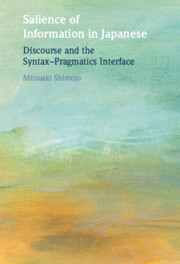Book contents
- Salience of Information in Japanese
- Salience of Information in Japanese
- Copyright page
- Contents
- Figures
- Tables
- Preface
- Abbreviations
- Notes on Transcriptions
- 1 Introduction
- 2 Background
- 3 Backward-Looking Salience and Argument Forms
- 4 Backward-Looking Salience and Argument Forms
- 5 Predicate-Less Constructions
- 6 Forward-Looking Non-salience and Argument Forms
- 7 Concluding Remarks
- References
- Index
3 - Backward-Looking Salience and Argument Forms
Discourse Analysis
Published online by Cambridge University Press: 28 March 2024
- Salience of Information in Japanese
- Salience of Information in Japanese
- Copyright page
- Contents
- Figures
- Tables
- Preface
- Abbreviations
- Notes on Transcriptions
- 1 Introduction
- 2 Background
- 3 Backward-Looking Salience and Argument Forms
- 4 Backward-Looking Salience and Argument Forms
- 5 Predicate-Less Constructions
- 6 Forward-Looking Non-salience and Argument Forms
- 7 Concluding Remarks
- References
- Index
Summary
Results from analyses of L1 and L2 Japanese written narratives are presented to discuss the relationships of backward-looking salience of referents and two morphosyntactic realizations of arguments: zero coding (i.e. discourse-driven zero anaphora) and topicalization with the topic marker wa. These forms are both known to be associated with givenness of information. The discussion of these forms is twofold. This chapter presents the analysis of discourse and chapter 4 presents the applications of RRG. For the discourse analysis, Centering Theory is utilized as the guiding framework, which will be extended with additional measures to define varying levels of salience. The usage of the two forms and their complementary and overlapping relationships are described in terms of the salience hierarchies proposed in this chapter, which also capture the L1–L2 differences in the usage of the argument forms and the more restricted usage of zero arguments in the L2 narratives.
- Type
- Chapter
- Information
- Salience of Information in JapaneseDiscourse and the Syntax–Pragmatics Interface, pp. 42 - 112Publisher: Cambridge University PressPrint publication year: 2024

